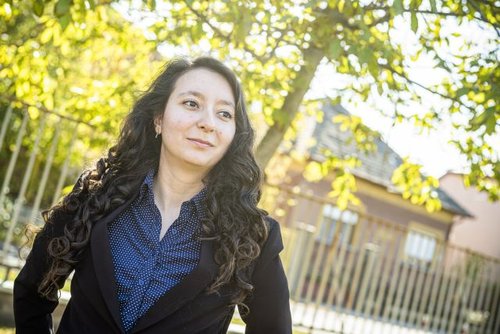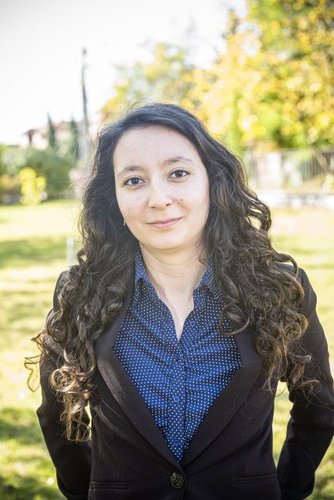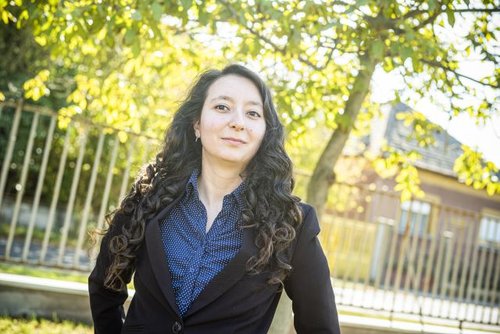It Takes More to See Than Just to Opening Your Eyes
2019. december 03., keddI always go and leave with a prayer, because God is the only One, who can comfort those, who have lost their visions - believes Alexandra Kovács Nógrádiné. We spoke with the pastor of the Ministry to the Visually Impaired and Blind of the Reformed Mission Centre about the Ministry and the opportunities, everyday lives of the visually impaired people.
What kind of personal experiences have led you to serve as a Reformed pastor?
I was born into a Catholic family. The religious education and the church services were always part of my life. I still have one determining memory from around age five: when we were leaving from mass, an old lady handed me a rosary and told me that she gave it to me because I will serve God. Although I didn’t know then what that meant, I gladly accepted it. Then my parents converted into the Reformed denomination and I started to go to the Reformed High School of Kecskemét where my days started with morning devotions. I felt first then that it was different from before, that God was already calling me. Lastly, the Bible verse I received at my confirmation speaks to me, “Have I not commanded you? Be strong and courageous. Do not be afraid; do not be discouraged, for the Lord your God will be with you wherever you go.” (Joshua 1:9) After all I still had my uncertainties, I wanted to be a doctor, but the question was rattling in my mind constantly: should I heal the body or the soul? The answer came with a Bible verse again, “Obey the Lord by doing what I tell you. Then it will go well with you, and your life will be spared.” (Jeremiah 38:20) Then I realized it isn’t as good when I am in control, so I handed over the throne to God. In Seminary I felt confirmed that this was my place.

You have been serving in the Ministry to the Blind for a year. What are some experiences you’ve had in this time?
I didn’t plan to do ministry, but my husband and I were asking God during the last year of my studies what His plan was, where should I go. Before my ordination exam I visited a community of visually impaired people in Hajdúszoboszló where they welcomed me with such a love that I felt I had a place among them. Finally I was commissioned here as a pastor. I didn’t expect to feel so great.
What is this field of mission about exactly?
With the help of my colleagues and volunteers we organize events in Budapest as well as in Debrecen, and we visit congregations. I have confirmation preparation classes on Mondays: four visually impaired sisters and brothers will have their confirmation at Pentecost of 2020. On Wednesdays we are organizing thematic conversations in Budapest in the institution at Hermina Street for those who have just recently lost their vision - we are trying to process this trauma together. Besides that, I lead a group in the institution on Hungaria Street on Thursdays. We have a spiritual retreat monthly on Saturdays in Debrecen, and on Sundays we go to congregations with sensitization programs.
How do those who have just recently lost their visions cope with the trauma?
In the spring a person told me that he does not feel it’s difficult anymore – not being able to see, because so he could get to know God. It was so shocking to me, that I teared up. In this service I always start and finish with a prayer because God is the only One who can comfort them. By myself nothing would have any effect, the Holy Spirit is the One who moves into their hearts and gives them relief and peace.
How do they find the activities of the Reformed Ministry to the Visually Impaired and Blind?
I very often visit individuals, because it’s the easiest way to invite the visually impaired people to our events. I used to send letters to different organizations, but mostly they reach out to us by phone: they ask for a visit, for a pastoral care, and I go to them immediately. Most of the times they exchange information about us to each other.

How is it effective to make the society more sensitive about accepting and helping the visually impaired people?
If we go the congregations, I always give a short sermon then I hand it over to my visually impaired friend. We used to be accompanied by a band, Landini (created by blind people) and sometimes a few people would recite poems. If we go to a congregation for a whole day, then we bring a special sensitization program with us: we show people how to use the white cane, explain how every day is spent when visually impaired- how do they travel or how do they cook, for example, a bean soup.
Everyone is probably interested in this. Please, tell us more but that!
In the institution at Hermina Street there is a three day long course where visually impaired people can come from the whole country. Special education teachers engage with them, teaching them how to use the white cane, how to transport alone, how to cope with everyday activities. Thanks to that, a visually impaired person can manage the same things that a seeing person can.
How do the seeing people take this experience?
They became astonished, but through that they realize that miracles exist. When I started the service, I also participated in this training in a National Institute for the Blind. When I learned to write in Braille and to manage everyday activities with my eyes folded, I understood what the visually impaired people feel like. It was great to experience that there is always hope - God’s help is needed, but it can be learned.
Did you prepare some program for the White Cane Day?
Organizations dealing with visually impaired people are organizing events throughout the country, so we had our program earlier on the 7th of October. We met in the institution at Hungaria Street. János Elek Mészáros, the winner of the Hungarian talent show (Csillag Születik) of 2012 sang and told stories expressing his testimony of faith and the visually impaired people recited poems. The White Cane Day is always a good opportunity to meet with and raise awareness to the people among us who cannot see.
Becoming the Eyes for the Visually Impaired
October 15th is the International White Cane Day that is the international day for the visually impaired. Just like how the tool helps the visually impaired raise awareness for their struggles, so this event drew our attention to making the lives of the blind and visually impaired people easier and better. Their integration with society is every one of our responsibilities. In Hungary, the programs of these series of events were held to strengthen empathy and understanding. The sensitization lectures were held in the hope of breaking the invisible wall between the seeing and the visually impaired.
What plans does the Ministry to the Visually Impaired and Blind have for the forthcoming period of time?
We would like to have programs not only in Budapest and Debrecen but other parts of the country as well. It would be good to reach out to the congregations with visually impaired members, and visit schools to organize retreats and sensitization programs. These are opportunities to give testimony that God has a plan for everyone.

“Faith comes from hearing” - could it be a creed among visually impaired people? How can the Word of God be conveyed beyond words to them?
By all means it is essential for them, because from they receive the most from hearing the Word of God. Many of them know Braille. There are Braille Bibles. I also try to write more songs for them in braille. A visually impaired sister of ours helps a lot with that. But there are some - especially among diabetic people - who cannot learn Braille, then only listening helps. For example, I say the words of the songs before, but there are already audio Bibles, talking telephones, computers or options on the internet too. It is harder to get them out and about than the most seeing people, many times they have fear and anxiety of travel, but the Ministry car helps to transport them. When the Word of God reaches them, they come.
Interview by Zsuzsanna Farkas
Translated by Tímea Tőke
Edited by Avery Gill
Photo: László Sebestyén
Contact us
Click here if you are interested in twinning.
Reformed Church in Hungary
Address: H-1146 Budapest, Abonyi utca 21.
PO Box: 1140 Budapest 70, Pf. 5
Email: oikumene@reformatus.hu
English, German and Korean language services in Budapest
Links
Recommended articles
-
Pastoral Letter in the Light of the Pandemic
Bishop Dr. István Szabó sent a pastoral letter of encouragement to the ministers serving in RCH’s congregations, expressing his gratitude for the persistence and creativity of the pastors.
-
RCH Joins in Pope's Call for Prayer
RCH published the call on congregations to join the initiative of Pope Francis, supported by ecumenical organisations, to unite in praying the Lord’s Prayer on Wednesday, 25 March, at noon.
-
English Speaking Worship Services Online
Each Sunday at 11 AM (CET) the St. Columba's Church of Scotland in Budapest, the international community of RCH invites you to join the worpship service on its facebook page.
-
Test of Humanity and Companionship
Reformatus.hu asked Dr. György Velkey, Director General of the Bethesda Children’s Hospital of RCH about the challenges of health care workers and ways of prevention against the pandemic.
-
All Church Events Suspended
In light of the coronavirus the Presidium of RCH requested congregations to suspend all church events with immediate effect. Beside restrictions, it calls for prayer, sobriety and responsibility.











